SBM-GOBARdhan Biogas Conference
To give a boost to Compressed Biogas (CBG) sector and accelerate Waste to Wealth & Circular Economy, the Ministry of Housing and Urban Affairs (MoHUA) organized the ‘SBM-GOBARdhan Biogas Conference in partnership with GIZ, Circular Waste Solutions and UNIDO at Bharat Mandapam, New Delhi. The day-long conference covered a range of engaging topics like, transformative policies for waste to CBG projects, policies for off-take arrangements, financing CBG plants, scaling up CBG in Germany, facilitating investments in CBG projects, and promoting global initiatives for CBG. The sessions were attended by over 400 participants from 25 States, 150 cities, 150 industry experts championing sustainability. The panel of delegates comprised of representatives from central ministries such as MoPNG and MNRE, officials from OGMCs, development partners, and Biogas Associations.
The utilization of biogas in India’s waste-to-energy transition holds significant potential for ensuring energy security and affordability, fostering entrepreneurship, creating employment opportunities, and stimulating local economies. Additionally, it effectively addresses the waste management challenge in India through the implementation of circular economy models. The primary objective of SBM-U 2.0 is to create a garbage-free urban India by prioritizing sustainable sanitation practices, efficient waste management, and the promotion of a circular economy. The target is to establish 15,000 TPD Bio-CBG plants by 2026. MoHUA has additionally instructed States/Urban Local Bodies (ULBs) to assist Oil and Gas Marketing Companies (OGMCs) in establishing Compressed Biogas (CBG) plants. This assistance includes offering long-term concession agreements and land leases, ensuring a continuous supply of segregated organic municipal waste etc.
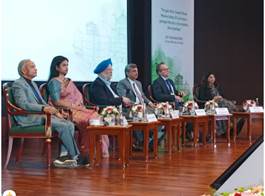
To take this forward, SBM-GOBARdhan Biogas Conference by MoHUA gave a platform to industry experts, related Central Government Ministries, officials from OGMCs, development partners, Biogas Associations, academic, research and financial institutions to share their knowledge and experience and exchange views on a range of topics on Waste to CBG and circular economy. Making two major announcements on Specialized subsidiary focused on waste processing projects & fund housed in HUDCO, to provide partial credit guarantees funded by govt fees and govt support, Housing and Urban Affairs Minister, Shri Hardeep Singh Puri said, “I think these two steps will go a very long way. First one- the engineering advice, which will come from Engineers India Limited who are executing a lot of projects in India and outside. And the second one- in a special focused way from HUDCO, which we will also finance under SBM-U 2.0 to make sure that these concerns are addressed” Highlighting CBG plants, Shri Manoj Joshi, Secretary, Ministry of Housing and Urban Affairs, said, “There is a need to fast-track implementation of CBG plants. We need to discuss how to reduce the risk of reduction in value of a certain plant, we need to fine tune this risk reduction and enhancement part for the finance and how to provide complete handholding to the cities.”
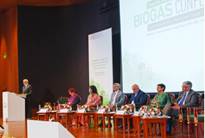
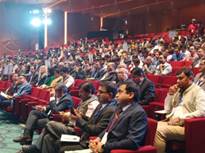
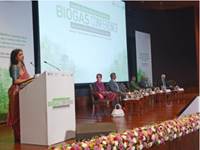
Setting the context of the conference, Ms Roopa Mishra, JS & MD, SBMU, MoHUA, said, “The four aspects which went in to build in the success of Phase 1 of SBM are the four Ps- Political Leadership and Policy, Public Finance, Partnership and People Participation. Taking forward these aspects, we embark on the journey of Waste to Wealth, Waste to Energy be it electricity of gas. Today’s conference sparks knowledge exchange, networking, and solutions for a cleaner tomorrow.” Speaking at the occasion, Mr. Shombi Sharp, United Nations Resident Coordinator in India said, “Cities also have a unique ability to mitigate climate change by strategically addressing issues of energy waste. 50% of waste is processed through bio-methanation, so seeing the fundamental shift of seeing waste as valuable to be recycled is at the heart of the circular economy.” Dr. Julie Reviere, Country Director, GIZ-India, Shri Pankaj Jain, Secretary, Ministry of Petroleum and Natural Gas also expressed their views on the CBG sector in the day-long conference. Addressing the gathering, Smt. Vini Mahajan, Secretary, Department of Drinking Water & Sanitation, Ministry of Jal Shakti , said, “Huge efforts made by all of government and all of society and every town and village declared itself ODF in a very short span of time. We go beyond ODF into overall waste management, solid and wet waste management in all its entirety will work for India today.”
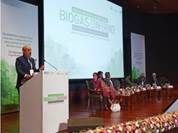
Speaking at the occasion, Shri Tarun Kapoor, Advisor to Prime Minister, emphasized on the complex job of waste management and how ULBs, private institutions, banks and collaborate to to handle their urban waste and ensure that it is processed.
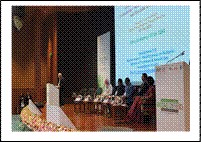
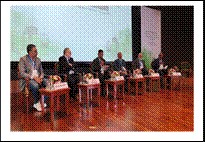
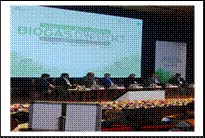
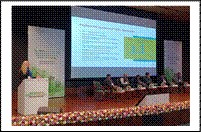
Union Minister, Shri Hardeep Singh Puri had an interactive session on implementation of Bio-CNG plants with Tamil Nadu, Bhubaneshwar and representatives from SIDBI & Private sector. at the conference. Ms Charlotte Morton, CEO, World Biogas Association shared her message and experience through a video message. Mr. Stephan Hesselmann, Minister Counsellor Economic Affairs, German Embassy addressed the delegates with focus on climate change, waste management & CBG projects. SBM-GOBARdhan Biogas Conference also highlighted discussions and experience sharing on challenges involved in CBG plant operations, financing opportunities and sustainable business models and fostering innovations & breakthrough technologies between various sector, development and private partners like GIZ, World Bank, ADB, SBI capital, SIDBI, EIL, World Biogas Association, Ever Enviro, Indian Oil Adani Ventures Limited, Verbio India and others. A video on introduction to Risk Sharing Facility (RSF) for waste sector entrepreneurs was also showcased in the conference.
The key takeaways of the conference were, VGF availability for Bio-CBG projects, Model MCA and RFP for all waste processing projects including bio-gas issued jointly prepared by MoHUA and DEA, Off- take arrangements in convergence with SATAT. The focus was on need for uniform policy at State level and ULBs for onboarding private concessionaires for the project and quality of waste by way of Seggregation.

